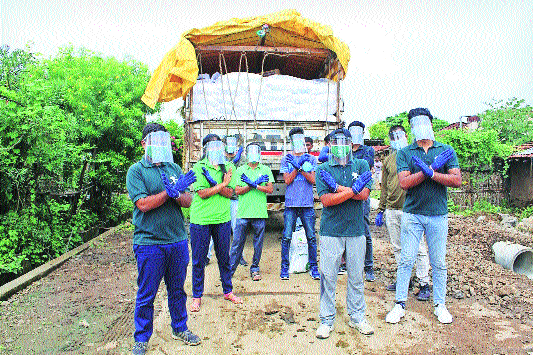Robin Hood Army tackling food wastage
| Date :28-Dec-2024 |

By Vaishnavi Pillay
There is an ingrained value in Indian society where serving food to others is seen as a way to celebrate achievements, honour religious traditions, or as an act of service. Be it any kind of event, there is a strong cultural habit of preparing enough food to ensure no one goes hungry. The intention is good, but it often leads to excess food, which ends up being wasted.
This contrast between the traditional values and the cultural habit of preparing sufficient food leads to wastage of food.
To bridge the gap between surplus and scarcity, the volunteers of Robin Hood Army, an NGO, have taken up a noble initiatives on city streets. When event venues or banquet halls wrap up their celebrations, they crisscross neighbourhoods, distributing leftover to those in need.
The NGO, which began in Delhi in 2014, has spread across the country and launched its Nagpur Chapter in 2016. Currently, it operates with a network of around 150 active volunteers in the city.
Nishchay Shende and Hari Baheti, two of the volunteers of Robin Hood Army Nagpur, shared with ‘The Hitavada’ that they followed a hyperlocal model, like if the food was in Dharampeth area, they distribute it to the needy in or around Dharampeth, and ensured the food is fresh and gets distributed quickly.
“In recent years, it is observed that with improvement in people’s lifestyle, food wastage has also increased. People tend to prepare excess food for events. If 500 guests are expected, they will usually cook for 700. But the turnout is often much lower. In Nagpur, almost every wedding ends up with enough leftover food to feed at least 200 people,” mentioned Nishchay.
Contd from page 1
The volunteers consider several factors while distributing food including weather and time the food was cooked. “During summer time or humid weather, the food can spoil quickly, so we follow strict guidelines by not collecting food that has been cooked more than six hours prior, except during winters, and distribute it within two hours after collection,” stated Nishchay. Before collecting, they ask necessary questions about the food’s freshness and even taste it to ensure it is completely safe for consumption. Robin Hood Army is a completely zero-fund organisation and all the work is done voluntarily. They conduct awareness drives once a year, where they meet managers of banquet halls, caterers, and institutions with mess facilities. These are key partners from whom they receive leftover food. The volunteers noted that people are generally happy to donate leftover, but the real challenge is encouraging them to cook mindfully in the first place as many do not embrace the idea of preparing just the right amount, which could prevent wastage altogether. Hari remarked, “There is limited awareness and participation from donors, and ensuring food safety and quality during redistribution.
Also, wealthier societies tend to waste more due to over-purchasing.”
They shared that apart from weddings, a large quantity of food is prepared in religious events to serve thousands or even lakhs of people. “While the intention is good, it often leads to a massive leftover food. Every year, we get calls with food left for thousands of people. Unfortunately, on such religious days, we cannot help much as people already take their meals from similar events across the city,” mentioned Nishchay.
Hari emphasises the need to promote portion control and awareness campaigns. “There should be policies for restaurants and caterers to donate surplus food, and use of technology can connect donors with recipients,” he added.
Nischay and Hari say that in the time of instant gratification, some mindful efforts may not give one instant validation of seeing their donation put to use immediately, but in the long run, it will have a much greater impact on someone’s life. “It is purely about giving back to society without any personal gains. This selfless model sometimes makes it tricky to manage logistics, but we keep going for the love of the cause,” they expressed.
